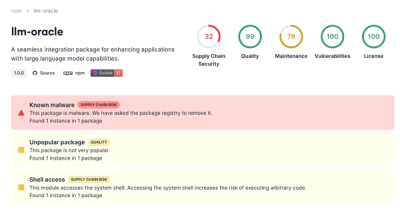
Security News
Python Overtakes JavaScript as Top Programming Language on GitHub
Python becomes GitHub's top language in 2024, driven by AI and data science projects, while AI-powered security tools are gaining adoption.
browserslist
Advanced tools
Share target browsers between different front-end tools, like Autoprefixer, Stylelint and babel-env-preset
The browserslist npm package is used to share target browsers and Node.js versions between different front-end tools, like Autoprefixer, Babel, and others. It utilizes a configuration file or package.json entries to specify the range of browser versions that your project supports. It helps in making decisions for transpiling JavaScript, adding vendor prefixes to CSS, and even defining which browser versions to test during the development process.
Defining target browsers
This feature allows you to define a range of browsers your project supports by specifying queries like market share, last versions, or excluding certain browsers. The code sample would typically be placed in a package.json file.
"browserslist": ["> 1%", "last 2 versions", "not dead"]Integration with build tools
Browserslist can be integrated with build tools like Webpack, Babel, or PostCSS to automatically apply browser-specific transformations based on the defined browser support criteria.
const browserslist = require('browserslist');
const supportedBrowsers = browserslist('> 0.5%, last 2 versions, Firefox ESR, not dead');CLI Usage
Browserslist provides a command-line interface (CLI) that can be used to check which browsers and versions are selected by your queries.
npx browserslist "> 1%, last 2 versions"Configuring environments
You can define different sets of browsers for various environments, like production or development, within a .browserslistrc file.
[production]
> 1% in US
[development]
last 1 chrome versionThe caniuse-api provides raw browser support data from Can I Use, which is similar to the data that browserslist uses. However, it focuses more on querying specific features for browser support rather than defining a list of supported browsers for a project.
Autoprefixer is a CSS post-processor that uses browserslist to add vendor prefixes to CSS rules. It is a consumer of browserslist data rather than a direct alternative, but it serves a similar purpose in terms of browser compatibility.
Babel's preset-env is a smart preset that allows you to use the latest JavaScript without needing to micromanage which syntax transforms are needed by your target environment. It uses browserslist to determine which features need to be transformed or polyfilled. While not a direct alternative, it shares the goal of adapting code to be compatible with different environments.
Library to share target browsers between different front-end tools. It is used in:
package.json or browserslist will be supported in 7.0)All tools that rely on Browserslist will find its config automatically,
when you add the following to package.json:
{
"browserslist": [
"> 1%",
"last 2 versions"
]
}
Or in .browserslistrc config:
# Browsers that we support
> 1%
Last 2 versions
IE 10 # sorry
Developers set browsers list in queries like last 2 version
to be free from updating browser versions manually.
Browserslist will use Can I Use data for this queries.
Browserslist will take browsers queries from tool option,
browserslist config, .browserslistrc config,
browserslist section in package.json or environment variables.
You can test Browserslist queries in online demo.
browserslist-useragent checks browser by user agent string
to match Browserslist target browsers query.caniuse-api returns browsers which support some specific feature.npx browserslist in your project directory to see project’s
target browsers. This CLI tool is built-in and available in any project
with Autoprefixer.Browserslist will use browsers query from one of this sources:
browsers option in Autoprefixer.BROWSERSLIST environment variable.browserslist config file in current or parent directories..browserslistrc config file in current or parent directories.browserslist key in package.json file in current or parent directories.
We recommend this way.> 1%, last 2 versions, Firefox ESR.You can specify the versions by queries (case insensitive):
last 2 versions: the last 2 versions for each browser.last 2 Chrome versions: the last 2 versions of Chrome browser.> 5%: versions selected by global usage statistics.
>=, < and <= work too.> 5% in US: uses USA usage statistics. It accepts two-letter country code.> 5% in alt-AS: uses Asia region usage statistics. List of all region codes
can be found at caniuse-lite/data/regions.> 5% in my stats: uses custom usage data.extends browserslist-config-mycompany: take queries from
browserslist-config-mycompany npm package.ie 6-8: selects an inclusive range of versions.Firefox > 20: versions of Firefox newer than 20.
>=, < and <= work too.iOS 7: the iOS browser version 7 directly.Firefox ESR: the latest [Firefox ESR] version.unreleased versions or unreleased Chrome versions:
alpha and beta versions.last 2 major versions or last 2 iOS major versions:
all minor/patch releases of last 2 major versions.since 2015 or last 2 years: all versions released since year 2015
(also since 2015-03 and since 2015-03-10).not ie <= 8: exclude browsers selected by previous queries.You can add not to any query.
Run npx browserslist in project directory to see what browsers was selected
by your queries.
$ npx browserslist
and_chr 61
and_ff 56
and_qq 1.2
and_uc 11.4
android 56
baidu 7.12
bb 10
chrome 62
edge 16
firefox 56
ios_saf 11
opera 48
safari 11
samsung 5
Browserslist works with separated versions of browsers.
You should avoid queries like Firefox > 0.
Multiple criteria are combined as a boolean OR. A browser version must match
at least one of the criteria to be selected.
All queries are based on the Can I Use support table,
e.g. last 3 iOS versions might select 8.4, 9.2, 9.3 (mixed major and minor),
whereas last 3 Chrome versions might select 50, 49, 48 (major only).
Names are case insensitive:
Android for Android WebView.Baidu for Baidu Browser.BlackBerry or bb for Blackberry browser.Chrome for Google Chrome.ChromeAndroid or and_chr for Chrome for AndroidEdge for Microsoft Edge.Electron for Electron framework. It will be converted to Chrome version.Explorer or ie for Internet Explorer.ExplorerMobile or ie_mob for Internet Explorer Mobile.Firefox or ff for Mozilla Firefox.FirefoxAndroid or and_ff for Firefox for Android.iOS or ios_saf for iOS Safari.Opera for Opera.OperaMini or op_mini for Opera Mini.OperaMobile or op_mob for Opera Mobile.QQAndroid or and_qq for QQ Browser for Android.Safari for desktop Safari.Samsung for Samsung Internet.UCAndroid or and_uc for UC Browser for Android.package.jsonIf you want to reduce config files in project root, you can specify
browsers in package.json with browserslist key:
{
"private": true,
"dependencies": {
"autoprefixer": "^6.5.4"
},
"browserslist": [
"> 1%",
"last 2 versions"
]
}
Browserslist config should be named .browserslistrc or browserslist
and have browsers queries split by a new line. Comments starts with # symbol:
# Browsers that we support
> 1%
Last 2 versions
IE 8 # sorry
Browserslist will check config in every directory in path.
So, if tool process app/styles/main.css, you can put config to root,
app/ or app/styles.
You can specify direct path in BROWSERSLIST_CONFIG environment variables.
You can use the following query to reference an exported Browserslist config from another package:
"browserslist": [
"extends browserslist-config-mycompany"
]
For security reasons, external configuration only supports packages that have
the browserslist-config- prefix. npm scoped packages are also supported, by
naming or prefixing the module with @scope/browserslist-config, such as
@scope/browserslist-config or @scope/browserslist-config-mycompany.
If you don’t accept Browserslist queries from users, you can disable the
validation by using the dangerousExtend option:
browserslist(queries, { path, dangerousExtend: true })
Because this uses npm's resolution, you can also reference specific files
in a package:
"browserslist": [
"extends browserslist-config-mycompany/desktop",
"extends browserslist-config-mycompany/mobile"
]
When writing a shared Browserslist package, just export an array.
browserslist-config-mycompany/index.js:
module.exports = [
'last 2 versions',
'ie 9'
]
If some tool use Browserslist inside, you can change browsers settings by environment variables:
BROWSERSLIST with browsers queries.
BROWSERSLIST="> 5%" gulp css
BROWSERSLIST_CONFIG with path to config file.
BROWSERSLIST_CONFIG=./config/browserslist gulp css
BROWSERSLIST_ENV with environments string.
BROWSERSLIST_ENV="development" gulp css
BROWSERSLIST_STATS with path to the custom usage data
for > 1% in my stats query.
BROWSERSLIST_STATS=./config/usage_data.json gulp css
BROWSERSLIST_DISABLE_CACHE if you want to disable config reading cache.
BROWSERSLIST_DISABLE_CACHE=1 gulp css
You can also specify different browser queries for various environments.
Browserslist will choose query according to BROWSERSLIST_ENV or NODE_ENV
variables. If none of them is declared, Browserslist will firstly look
for development queries and then use defaults.
In package.json:
"browserslist": {
"production": [
"last 2 version",
"ie 9"
],
"development": [
"last 1 version"
]
}
In .browserslistrc config:
[production]
last 2 version
ie 9
[development]
last 1 version
If you have a website, you can query against the usage statistics of your site:
Import your Google Analytics data into Can I Use.
Press Import… button in Settings page.
Open browser DevTools on Can I Use and paste this snippet into the browser console:
var e=document.createElement('a');e.setAttribute('href', 'data:text/plain;charset=utf-8,'+encodeURIComponent(JSON.stringify(JSON.parse(localStorage['usage-data-by-id'])[localStorage['config-primary_usage']])));e.setAttribute('download','stats.json');document.body.appendChild(e);e.click();document.body.removeChild(e);
Save the data to a browserslist-stats.json file in your project.
Of course, you can generate usage statistics file by any other method. File format should be like:
{
"ie": {
"6": 0.01,
"7": 0.4,
"8": 1.5
},
"chrome": {
…
},
…
}
Note that you can query against your custom usage data
while also querying against global or regional data.
For example, the query > 1% in my stats, > 5% in US, 10% is permitted.
If you plan to use Browserslist on client-side (e. g., tools like CodePen) Browserslist could take big part of your bundle (150 KB).
But the biggest part of this size will be region usage statistics, which could
be useless for you. IgnorePlugin could cut it:
const webpackConfig = {
…
plugins: [
new webpack.IgnorePlugin(/caniuse-lite\/data\/regions/)
]
}
This plugin will reduce Browserslist size from 150 KB to 6 KB. But you loose
> 1% in US queries support.
var browserslist = require('browserslist');
// Your CSS/JS build tool code
var process = function (source, opts) {
var browsers = browserslist(opts.browsers, {
stats: opts.stats,
path: opts.file,
env: opts.env
});
// Your code to add features for selected browsers
}
Queries can be a string "> 5%, last 1 version"
or an array ['> 5%', 'last 1 version'].
If a query is missing, Browserslist will look for a config file.
You can provide a path option (that can be a file) to find the config file
relatively to it.
For non-JS environment and debug purpose you can use CLI tool:
browserslist "> 1%, last 2 versions"
You can get total users coverage for selected browsers by JS API:
browserslist.coverage(browserslist('> 1%')) //=> 81.4
browserslist.coverage(browserslist('> 1% in US'), 'US') //=> 83.1
Or by CLI:
$ browserslist --coverage "> 1%"
These browsers account for 81.4% of all users globally
$ browserslist --coverage=US "> 1% in US"
These browsers account for 83.1% of all users in the US
Browserslist caches the configuration it reads from package.json and
browserslist files, as well as knowledge about the existence of files,
for the duration of the hosting process.
To clear these caches, use:
browserslist.clearCaches();
To disable the caching altogether, set the BROWSERSLIST_DISABLE_CACHE
environment variable.
2.11.3
path: undefined option.FAQs
Share target browsers between different front-end tools, like Autoprefixer, Stylelint and babel-env-preset
The npm package browserslist receives a total of 46,706,430 weekly downloads. As such, browserslist popularity was classified as popular.
We found that browserslist demonstrated a healthy version release cadence and project activity because the last version was released less than a year ago. It has 1 open source maintainer collaborating on the project.
Did you know?

Socket for GitHub automatically highlights issues in each pull request and monitors the health of all your open source dependencies. Discover the contents of your packages and block harmful activity before you install or update your dependencies.

Security News
Python becomes GitHub's top language in 2024, driven by AI and data science projects, while AI-powered security tools are gaining adoption.

Security News
Dutch National Police and FBI dismantle Redline and Meta infostealer malware-as-a-service operations in Operation Magnus, seizing servers and source code.

Research
Security News
Socket is tracking a new trend where malicious actors are now exploiting the popularity of LLM research to spread malware through seemingly useful open source packages.